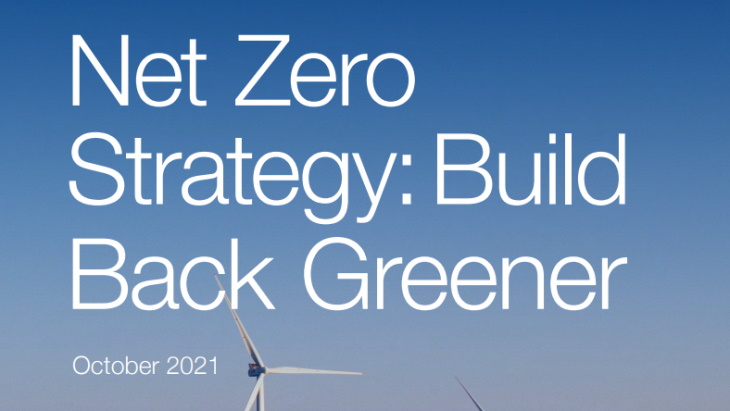"Building on the Prime Minister's Ten Point Plan, today's UK Net Zero Strategy sets out a comprehensive economy-wide plan for how British businesses and consumers will be supported in making the transition to clean energy and green technology - lowering Britain's reliance on fossil fuels by investing in sustainable clean energy in the UK, reducing the risk of high and volatile prices in the future, and strengthening our energy security," the government said.
The policies in the strategy include the UK being powered entirely by clean electricity by 2035, "subject to security of supply". It also envisages the country having 40 GW of offshore wind capacity by 2030, together with more onshore wind, solar and other renewables. The strategy also calls for 1 GW of floating offshore wind capacity by 2030, as well as the deployment of new flexibility measures, including storage, to help smooth out future price spikes.
Nuclear projects
The government said it intends to secure a final investment decision on a large-scale nuclear plant by the end of this parliament, "subject to clear value for money and all relevant approvals". In December 2020, the government announced the start of formal negotiations on the Sizewell C plant in Suffolk and those negotiations are ongoing. To facilitate a decision this parliament, the government plans to establish the Regulated Asset Base model to fund new nuclear projects at a low cost of capital, saving consumers money.
The government said it will also "take measures to inform investment decisions during the next parliament on further nuclear projects as we work towards our net zero target." This, it said, will include consideration of large-scale and advanced nuclear technologies, including small modular reactors (SMRs) and potentially advanced modular reactors.
"As part of this, we are announcing a new GBP120 million Future Nuclear Enabling Fund to provide targeted support in relation to barriers to entry," the government said. The fund will help in "retaining options for future nuclear technologies, including small modular reactors, with a number of potential sites including Wylfa in North Wales." It noted, "Funding like this could support our path to decarbonising the UK's electricity system fifteen years earlier from 2050 to 2035.
"Further details of how this fund will operate will be published in 2022 alongside details of a roadmap for deployment that takes into account value for money."
The government noted it is also providing funding for an SMR design through its GBP385 million Advanced Nuclear Fund and is progressing plans for an advanced modular reactor demonstrator in the early 2030s.
The Net Zero Strategy will be submitted to the United Nations Framework Convention on Climate Change as the UK's second Long-Term Low Greenhouse Gas Emission Development Strategy under the Paris Agreement.
Also published today is UK's first Net Zero Research and Innovation Framework which will support the delivery of the Net Zero Strategy by setting out the key net zero research and innovation priority areas for the UK over the next 5-10 years. Together these documents set out a long-term plan for the green economy that the government will report against.
Responding to the strategy, Nuclear Industry Association Chief Executive Tom Greatrex said: "It is very welcome to see the government commit new money to the development of nuclear projects and set out its intention to bring Sizewell C to a Final Investment Decision.
"We need to invest quickly to clean up the grid by 2035 and ensure our energy security, so we look forward to seeing details of this new fund, money for SMR deployment and legislation for Regulated Asset Base financing coming forward soon."
Public support high
The publication of the Net Zero Strategy comes as a new YouGov survey shows that two-thirds of Britons (65%) believe that nuclear should play a role in the country's climate change strategy. This includes 34% who say that nuclear should play a major role in attempts to make the UK's electricity low or no-carbon - on a par with renewable energy sources like solar and wind. Another 31% want to see it play a minor role. Only 12% say the UK should not generate any nuclear energy.
The survey also explored people's awareness of nuclear as a low-carbon source of energy. Fewer than half of Britons (46%) consider nuclear to be zero-carbon (14%) or low-carbon (36%). Meanwhile, 30% believe it to be moderate (14%) or high-carbon (16%). 23% of respondents said they did not know.
"Belief that nuclear power creates greater levels of carbon emissions is higher among those who don't want to see it as part of Britain's energy mix: 46%, compared to only 21% who want to see it play a major role and 33% who want it to play a minor role," YouGov said.
"This suggests that a significant chunk of opposition to nuclear energy could be based on the faulty assumption that it is a sizeable carbon emitter, and that greater awareness could reduce objections. Nevertheless, there will continue to be many whose concerns about nuclear energy stem from other issues, like the radioactive waste material it produces, or the risk of meltdown."





_87299.jpg)
_52351.jpg)








